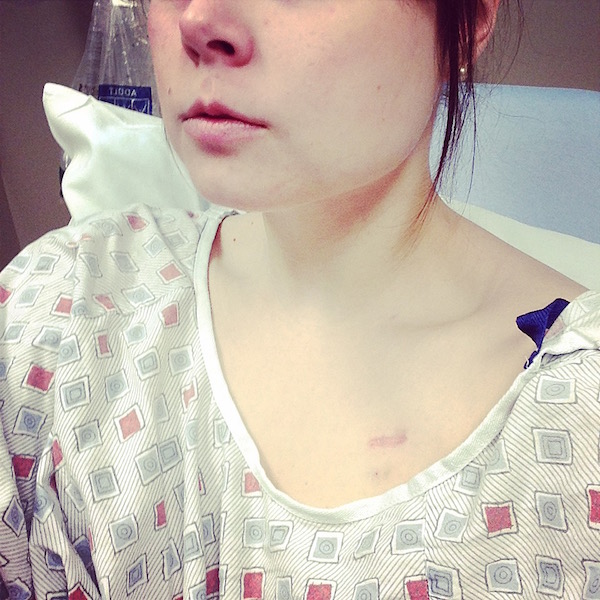One rainy Saturday night in February, I stood over a sink in a public restroom, silently washing my hands. I looked over to see a woman at the sink opposite of me; she seemed to be reviewing my reflection in the large bathroom mirror.
Her gaze hovering intently on the pale pink Power Port scar above my right breast, and the feeding tube delicately hung over my skirt. Locating her gaze to meet my eyes, she very frankly asked, “Do you have cancer?”
I shook my head and replied that I did not have cancer, but a rare disease called systemic scleroderma. The woman without a word shut off her sink, reached over to the paper towel dispenser and then turned back to me. “Oh,” she replied, and quickly left the restroom.
I stood wavering between a few different emotions: anger, hurt, disappointment and unbelief. Did my disease really deserve nothing better than a simple “Oh”? I pondered for a moment what this encounter would have been like if the illness I was stricken by was in fact cancer. This stranger probably would have told me that I was brave, and she may have even shared with me stories of loved ones she knew battling cancer. There most certainly would have been a tear shed, and even a silent hug, followed by a “But you’re so young!” and a sincere “Good luck!” Why is it that only one disease seems to command the compassion of others, while the rest are lost and forgotten?
The answer lies quite simply in our media. With recent releases such as “The Fault in Our Stars,” “Me and Earl and the Dying Girl,” “Chasing Life” and “Red Band Society,” disease seems to have recently stormed the media spotlight. Suddenly illness is a hot Hollywood theme, in one fluid motion leaving vampires who sparkle, ridiculously attractive young werewolves, and supernatural romance in its wake. While many people would argue that it brings media attention to those with medical conditions, some of us are not so swayed. The media portrayal of disease is extremely limited, focusing almost exclusively on cancer.
In the Hollywood world, cancer is portrayed to be a disease that only afflicts devilishly handsome young men and women who all face it valiantly with sarcasm and humor. Their stories are full of “cancer perks,” getting away with shenanigans, and young, tragic romance, leaving at least one main character dead. Think on this for a moment. If a “Fault in Our Stars Two” was created, would you watch it? Before you jump to yes, know the plot. It consists of Hazel, after the devastating loss of her love, living everyday life as someone who is terminally ill. It would probably include a lot of Netflix watching and days spent in bed. Eventually her recurring episodes of fluid-filled lungs would increase; she might suffer horrendous pain that no opiate could ever relieve.
No one is interested in watching endless suffering; viewers want a cure, or a quick demise. Chances are, due to that audience preference, you will never see scleroderma, lupus, multiple sclerosis, mitochondrial disease, Ehlers-Danlos syndrome, myasthenia gravis and so many others life-threatening illnesses portrayed in film. These diseases are what you call chronic and degenerative; this means the patient might have these conditions with no hope for a cure their entire life.
Similar to cancer patients, we are bound to oxygen tanks, feeding tubes, trachs, central lines and other medical devices. We take large amounts of prescription medications, have weekly procedures, surgeries, and tests, attend support groups, struggle with severe pain, anxiety, and depression, mourn over the lose of our former lives and unfortunately, must also watch as the friends we have might die. Many of us actually go through aggressive chemotherapy as treatment for our disease.
Unlike these movie and TV portrayals of illness that have become so popular, chronic illness sufferers receive no “cancer perks,” as the cinema likes to call it. All we receive are snide comments about how we don’t look sick, that we shouldn’t be parking in handicapped spaces, and that we would be healed if we only changed our diet and lifestyle. We sometimes even get told, “At least its not cancer!” The world knows what cancer is; however, the majority of people have no idea what beholds a chronic disease sufferer because they have never been exposed to it. Can we truly blame people for their lack of empathy when all the media feeds them are stories centered on one disease?
So, to the woman in the restroom who decided my disease wasn’t enough to even generate a generic positive reinforcement, I do not hold you accountable. Nevertheless, as a patient suffering from an extremely debilitating, and eventually terminal illness that has destroyed my life, I ask that you please recognize that any disease, whether you’ve heard of it or not, deserves compassion.
A version of this post originally appeared on A Day in the Life of a Tube Fed Wife.


